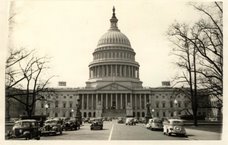Until 1947 the U.S. had a peculiar succession plan should disaster strike both the president and the vice-president. The reins of power in those days were to be turned over to the senior cabinet official -- the Secretary of State.
For many ponderous reasons, Congress debated this situation for years and finally enacted a law in '47 which placed 2 additional persons between the the White House and the Cabinet, in the line of Succession, that is. First the Speaker of the House would be the next in line for the office of the presidency and if he or she was unable to serve, it would turn to the Senate president pro tempore.
Clearly having ELECTED representation closer to the succession plan was at least part of the intent. Otherwise, you might end up with something unexpected, like someone, say who's never run for city council, never served a day in military service, never raised a family, or never sat around town hall tables listening to constituents and helping problem-solve their difficulties. You might end up with someone without a clue of diplomacy. You might also end up with someone in the Oval Office who doesn't have a close grip on what most of us call a sense of 'reality' -- a sense of the responsibility for the heartbeat of the nation.
In looking back at the days of the Cold War, the Kruschev regime, the dreaded 'duck & cover' atomic bomb drills of grade school in the 1960's, it's worth reflecting on the people who have held the office of Secretary of State. What negotiating skills, interpersonal warmth and appeal, and modern-day knowledge coupled with wisdom and savvy judgment from a long career did he or she bring to the U.S. - International table?
At any dinner party, you're going to be hard-pressed to get anyone to name 6 out of the last 12 Secretaries of State. They seem to matter a lot when they're in office. When they're gone, unless they're Henry Kissinger who never tires of the limelight, they mostly wait to collect their Presidential Medal of Freedom. Of course, there are exceptions.
What you notice, though, is that nearly all have had lives of deep public service long before being asked to fill the office of Secretary of State. Military service is just one component of public service such as seen in the histories of Dean Rusk, Wm. Rogers, Kissinger, Cyrus Vance, Warren Christopher, and notably Colin Powell. Although in the case of the first woman, Madeleine Albright (the first female Secretary of State --under Clinton), she did not serve militarily. Some Secretaries of State also had distinguished careers as elected officials such as Christian Herter (Gov. of Mass., & Congressman) and Edmund Muskie (Senator). Visibly serving the international diplomatic community through UN appointment is another way in which Secretaries of State in-the-making (in hindsight) have 'earned their spurs' such as William Rogers and Madeleine Albright.
Some recent Secretaries of State have served their administrations well beyond that office. George Schultz uniquely racks a resume as Sec. of State, Sec. of Treasury, and the Sec. of Labor crossing decades of service. James A. Baker III not only served as White House Chief of Staff, he was chair of the president's Economic Policy Committee and was Undersecretary of Commerce.
One cannot help but come away with a view that the last 40+ years worth of Secretaries of State is quite impressive no matter whose administration they served politically. It is not a merely partisan matter. The breadth of talent, personal command, wherewithal, meaningful interpersonal connections and genuine goodwill to draw upon all contributes to a tidy dowry that any Secretary of State brings to bear in the office.
So why are so many people, even those close to the president, having a giant Rolaid moment over his insistence that Dr. Condoleezza Rice (he nicknamed her "the Warrior Princess") is the best "American face to the world" and her nomination for Secretary of State should be expediently supported by Congress?
Recently both Pat Buchanan and Jay Rockefeller (a contrast, let's agree) shared their deep concern over President Bush's nomination of Dr. Rice. (Calling this to question is akin to calling the president's judgment to question; otherwise. . . why go there? The president's deep attachment to Dr. Rice is unsettling, though.)
Their reasons were different, however. Buchanan felt that a Secretary of State must be independent of the White House to be effective. That is, he or she must be able to bristle the White House from time to time if he or she is doing the job well. There's just too much at stake to be a 'Yes man/woman' token spokesperson for the White House. He didn't think that Dr. Rice could be independent. Rockefeller, on the other hand, felt that Dr. Rice's lack of 'sterling' success as a Leader in the NSA would hamper her ability at State and that she wasn't sufficiently 'seasoned' to step into 'shoes that big' (my metaphor, not his). That Dr. Rice's driving influence in international politics should be her professor/mentor, Dr. Albright's late father, Josef Korbel, is just a little more of the peculiar.
Dr. Rice has spent the last recent years grooming the president on foreign affairs particularly. They work hand-in-glove. Heck, they work so closely that she sometimes has been heard to slip and refer to him as her "husband." It's all understandable. And it's also understandable that his zealous laudatory remarks about her illustrious career would cause her to weep on stage. True, I can't picture Kissinger weeping for Nixon, but then it's an emotional time, right?
Having worked for years to see women and minorities advance in public service careers, this is a time when I want to feel good about the appointment of Dr. Rice. I don't though. She might make an amazing undersecretary to the Right person, who, though, I'm not even entertaining because the die is cast, I know.
Is she truly the BEST American to represent the U.S. to the world diplomatically at this critical time? No. It's simply not possible. Look at her credentials. Look at her performance. Look at her historic profile. We know more about her background in academics, ballet, piano, song, and sports than can be fairly articulated by a panel of spokespersons for her as a diplomatic leader.
Where are her supporters -- besides the Bush family that is? Bring out Al Haig, Kissinger, Albright, Baker, Schultz, and deeply examine what former Secretaries of State know must be present for a Sec. of State to make it work on the global front. Who knows better than they do?
Poll some of our strongest allies. We surely have some, right? Shouldn't we care what some of our allies think about, well. . . Anything?
Every cabinet appointment, especially Secretary of State, should not be the opportunity to pay back historic thanks for sticking around and working hard. Think about it -- who will turn the lights out in Texas at this rate?
Not long ago, 'Condi' Rice said in an interview that she would not stay for Bush's 2nd term. Of course, she was with the NSA then. After Powell's departure, is Condi really the answer? I think in fairness to her, the president should cut her some freedom and let her return to academia where she can write about an amazing four years. Because the next four will only read tragically for her, if not the nation, and we can ill afford that now.
Dig deeper Mr. President, you will find the likes of a Colin Powell, George Schultz, or William Rogers if you just scan the horizon beyond your security blanket.
Don't bring us a Warrior Prince or a Warrior Princess; bring us a Secretary of State worthy of the office and the responsibility. Bring us someone who will tell you to take a weekend and go home to Crawford when Karl just wants to meddle in world diplomacy just because he can.
But most of all, in that remote possibility, that you, VP Cheney, Speaker Hastert, and Senate Pres. Pro Tempore Stevens have all eaten a bad batch of oysters some weekend at Kennebunkport, appoint a Secretary of State who will be able to stand and deliver.
We deserve it. We ask it. To be clear, we demand nothing less. After the bad oysters, it's just 4 degrees of separation for the Sec. of State since 1947 -- to the Oval Office.
skip to main |
skip to sidebar

The last word on the subject

You can run, but you can't hide

Until the Last Note

Scoundrels, Thieves & Infrequent Saints
"Save me from the lion's mouth: for thou hast heard me from the Horns of the Unicorns." (Psalm 22:21) Commentary, complaints, woes, and wonders about Life, the human condition, grubberment, 'popped' culture, and the Planet Girth.
Because I Said So

The last word on the subject
Out for Bear

You can run, but you can't hide
Muy Mysterioso

Until the Last Note
Here We Go Again

Scoundrels, Thieves & Infrequent Saints